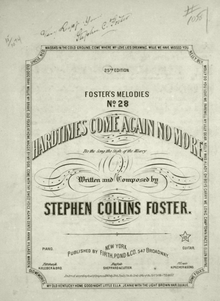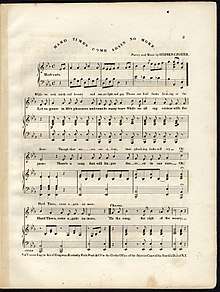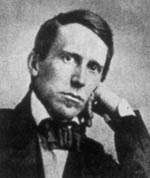Hard Times Come Again No More
"Hard Times Come Again No More" (sometimes, "Hard Times") is an American parlor song written by Stephen Foster. It was published in New York by Firth, Pond & Co. in 1854 as Foster's Melodies No. 28. Well-known and popular in its day,[1] both in America and Europe,[2][3] the song asks the fortunate to consider the plight of the less fortunate and includes one of Foster's favorite images: "a pale drooping maiden".
| "Hard Times Come Again No More" | |
|---|---|
 1854 sheet music cover | |
| Song | |
| Published | 1854 |
| Songwriter(s) | Stephen Foster |
The first audio recording was a wax cylinder by the Edison Manufacturing Company (Edison Gold Moulded 9120) in 1905. It has been recorded and performed numerous times since. The song is Roud Folk Song Index #2659.
A satirical version about soldier's food was popular in the American Civil War, "Hard Tack Come Again No More".
Lyrics

1.
Let us pause in life's pleasures and count its many tears,
While we all sup sorrow with the poor;
There's a song that will linger forever in our ears;
Oh! Hard times come again no more.
Chorus:
'Tis the song, the sigh of the weary,
Hard Times, hard times, come again no more.
Many days you have lingered around my cabin door;
Oh! Hard times come again no more.
2.
While we seek mirth and beauty and music light and gay,
There are frail forms fainting at the door;
Though their voices are silent, their pleading looks will say
Oh! Hard times come again no more.
Chorus
3.
There's a pale drooping maiden who toils her life away,
With a worn heart whose better days are o'er:
Though her voice would be merry, 'tis sighing all the day,
Oh! Hard times come again no more.
Chorus
4.
'Tis a sigh that is wafted across the troubled wave,
'Tis a wail that is heard upon the shore
'Tis a dirge that is murmured around the lowly grave
Oh! Hard times come again no more.
Chorus
Recordings

"Hard Times Come Again No More" has been included in the following:
- Dolly Parton opens her 1980 song "Hush-A-Bye Hard Times" with an a cappella verse from the song.
- The North Carolina band Red Clay Ramblers featured the song on their 1981 album Hard Times.
- Recorded by Irish singer Mary Black on her 1984 album Collected.
- Akiko Yano sings this song on her 1989 album "Welcome Back"
- On Syd Straw's 1989 debut album Surprise, Straw and X frontman and solo artist John Doe recorded a version of the song.
- By Kate & Anna McGarrigle on the 1991 Songs of the Civil War collection.
- By Emmylou Harris in her 1992 live album At the Ryman.
- By Bob Dylan for his 1992 album Good as I Been to You.
- As the penultimate track on the 1992 debut album from The Lost Dogs, Scenic Routes.
- Harvey Reid plays his acoustic guitar on his 1994 album Chestnuts
- In Series One (1995) of the "Transatlantic Sessions", Hard Times Come Again No More was performed by an ensemble composed of Kate and Anna McGarrigle, Rufus Wainwright, Emmylou Harris, Mary Black, Karen Matheson and Rod Paterson.
- The 1995 movie Georgia with Mare Winningham and Jennifer Jason Leigh sung by Mare Winningham and band.
- The 1995 movie The Neon Bible performed by Thomas Hampson.
- Nanci Griffith on her 1998 effort Other Voices Too (A Trip Back to Bountiful).
- Ambassadors of Harmony perform an a cappella male chorus barbershop arrangement on their 2000 album Sing Sing Sing![4]
- The 2000 Appalachian Journey, for voice & piano with Edgar Meyer (bass), James Taylor (vocals) Mark O'Connor (violin or fiddle) and Yo-Yo Ma (cello).
- eastmountainsouth (aka Peter Bradley Adams & Kat Maslich) recorded this song on their eponymous album in 2003.
- Johnny Cash on the Redemption Songs disc of the 2003 Unearthed box set of out-takes and alternate versions from his American Recordings series.
- Mavis Staples recorded it for the Grammy award-winning album Beautiful Dreamer (2004).
- In 2005, the song was included in the soundtrack Cameron Crowe's Elizabethtown, performed by Eastmountainsouth.
- The 2005 film My Brother's War by Whitney Hamilton.
- Matthew Perryman Jones included it on his 2006 album Throwing Punches in the Dark.
- Andru Bemis recorded it on his 2006 album Rail to Reel.
- Bruce Springsteen and the E Street Band's 2009 Working on a Dream Tour and captured on their 2010-released London Calling: Live in Hyde Park concert video, in the midst of the Great Recession.
- Mary J. Blige and The Roots at the 2010 Hope for Haiti Now: A Global Benefit for Earthquake Relief telethon.
- In the Season 2 finale of Parenthood by the same name, the song was contributed to the soundtrack by Brett Dennen.
- The 2012 Voice of Ages by The Chieftains, with Paolo Nutini.
- The 2012 Eesti Kullafond collection of Estonian folk-pop group Folkmill.[5]
- An Iron & Wine performance featured in commercials promoting the 2012 Copper television series on BBC America.
- Black 47, on the 2014 album Last Call.
- The 2014 9/11 Memorial commemoration (bagpipes adaption).
- Kristin Chenoweth performed the song on her 2014 live album Coming Home.
- Katy Treharne sings it on the Tearfund with 'West End has Faith' 2015 album Speechless.[6]
- Joel Plaskett's 2015 album The Park Avenue Sobriety Test.
- Annie Moses Band performed the song on their 2015 album American Rhapsody.
- Australian artists Paul Kelly and Charlie Owen included the song on their 2016 album Death's Dateless Night.
- Civilization VI uses the song as the theme for Theodore Roosevelt of the American civilization.
- Madeleine Peyroux sang it on her album Secular Hymns (2016)
- Jennifer Warnes, from her 1979 album Shot Through The Heart
- Shully Natan sang it in Hebrew.
- Mavis Staples' version opens the second episode of Ken Burns' 2019 PBS documentary miniseries, Country Music.
References
- R.J. "The Fields of June". Southern Literary Messenger Vol. XXI No.8 (August 1855) Richmond, Va., p. 503: "Among these may be mentioned that sad plaintive beautiful melody of Foster's—'Hard times come again no more.' Have you heard it? What an echo of sadness in it! - :'Tis the song the sigh of the weary— - :Hard time! hard times! - :Many days you have lingered - :Around my cabin door, - :But hard times come again no more!"
- Sandford, Henry, Mrs. The Girls' Reading-Book. London: W. & R. Chambers (1876), p. 201: "It was in a sewing-school in Lancashire, during the latter part of the Cotton Famine, that the well-known song 'Hard times, hard time, come again no more!' first became familiar to my ears."
- Hubbard, W.L. (ed.). History of American Music. New York: Irving Squire (1908), p. 80: "Other songs beside those designated as plantation melodies, but all more or less impregnated with sentiment, now came rapidly from his pen and obtained a wide popularity not only in America but in Europe as well. Such songs as ..."Hard Times Come Again No More,"... have become familiar to many nationalities."
- "Sing Sing Sing!". aoh.org. Archived from the original on 16 July 2016. Retrieved 24 July 2016.
- "Folkmill - Eesti Kullafond". lasering.ee. Retrieved 15 May 2016.
- "Speechless". amazon.com. Retrieved 14 May 2016.
Audio
External links
- "Hard Times Come Again No More", Edison Male Quartette (Edison Gold Moulded 9120, 1905)—Cylinder Preservation and Digitization Project.
- "Hard Times Come Again No More" at the Vaughan Williams Memorial Library
